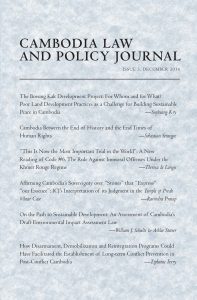BY THERESA DE LANGIS
In the past two decades, a growing body of international obligations has been created to intensify attention to the specific ways that women experience armed conflict and atrocity, and to fortify accountability for gender-based violations. Among these, a cluster of resolutions of the United Nations (UN) Security Council (SC), often referred to as the UNSCR Women Peace and Security Agenda, has called for more consistent and rigorous investigations and prosecution of conflict-related sexual violence, progressively stressing the imperative of linking gender discrimination and women’s oppressed status as contributing factors to the root causes of conflict.[2] Most recently, the committee monitoring the Convention on the Elimination of All Forms of Discrimination against Women (CEDAW) promulgated General Recommendation No. 30, delineating the application of the treaty in conflict and post-conflict situations and its complementarities with international humanitarian and criminal law.[3] The Extraordinary Chambers in the Courts of Cambodia for the Prosecution of Crimes Committed during the Period of Democratic Kampuchea (ECCC) was established under Cambodian law in 2004 with the mandate to bring to trial senior Khmer Rouge leaders and those most responsible for crimes allegedly committed between 17 April 1975 and 6 January 1979 under the Democratic Kampuchea regime. Backed by the UN, the hybrid court, although situated within the Cambodian court system, includes mixed panels of international and national judges, prosecutors and officers.[4] Four cases are before the ECCC (Cases 001-004).
Case 002 commenced proceedings in November 2011 and is considered a landmark in international law given the gravity of the alleged crimes and the leadership level of the defendants. Stephen J. Rapp, U.S. Ambassador at Large for War Crimes Issues, has referred to Case 002 as “the most important trial in the world” today.[5] Nevertheless, the ECCC’s legacy from Case 002 will prove extremely limited in advancing the lessons learned from past tribunals in addressing sexual violence crimes. This is primarily due to the Court’s reluctant and narrow approach in taking up only a portion of the full spectrum of reported crimes committed under the regime.
The co-prosecutors’ office did not initially ask for investigations of forced marriage in Case 002; it submitted a supplementary request after concerted advocacy by civil parties and their lawyers.[6] The Court’s investigating judges then found evidence that forced marriage occurred in mass ceremonies “during the entire period of the regime in nearly every zone.”[7] Today, the charge of forced marriage is second only to forced transfers in the number of civil parties who have come forward as victims of the widespread application of a Khmer Rouge policy. The crime as taken up by the ECCC is unique in that men were also forced to marry, and also suffered the psycho-social consequences of the crime. At least one instance has been reported of a husband forced to rape his wife, as Khmer Rouge officials physically held her down, and it is reported to have been common for recalcitrant couples to be “educated” about consummating the marriage or face punishment or death.[8]
Importantly, the Case 002 closing order names forced marriage and rape inside the context of forced marriage as a central element of control under the Khmer Rouge regime.[9] Yet while the closing order points to instances of other forms of sexual violence, including most particularly rape at security centers, the indictment determines that the accused cannot be linked to these crimes because the Khmer Rouge aimed to prevent them through an official policy.[10]
This conclusion of the closing order has been rigorously contested, including through a mounting corpus of research and documentation on sexual and gender-based violence under the regime by both cadres and officers, both within forced marriage and outside of it.[11] The first Cambodian Women’s Hearing on Sexual Violence under the Khmer Rouge, convened in 2011 by local human rights organization the Cambodian Defenders Project (CDP), served as a non-judicial truth-telling event for victims and witnesses to publically “testify” about these crimes, with testimonies recounting systematic rape prior to execution; rape as an instrument of torture; mass rape, gang rape and repeated rapes; and rape with the object of sexual mutilation. In each instance, perpetrators were identified as agents of the regime, yet no punishment was evident.[12]
Margot Wallstrom, then Special Representative of the Secretary-General on Sexual Violence in Conflict, presented an opening message by video at the Women’s Hearing, and her Chief of Staff, Nancee Oku Bright, presented the keynote address and observed the totality of the Hearing. Following the event, Wallstrom sent letters to the ECCC, the Royal Government of Cambodia and the UN, and published an open letter in the English-language Phnom Penh Post newspaper, urging the Court to use its full resources to address sexual crimes, including investigating and expanding the scope of what can be prosecuted, as well as providing adequate recognition of and reparations for victims.[13] Cambodia has thereafter warranted mention in each of the subsequent annual reports of the UN Secretary-General on conflict-related sexual violence.[14] The UN CEDAW Committee has also noted its concern that the ECCC has not adequately addressed sexual and gender-based violence under the regime. In its Concluding Observations on the combined 4th and 5th periodic reports of Cambodia in 2013, the Committee recommends “effective” redress for victims, including adequate reparations and integration of these issues into national policies and strategies aimed at addressing violence against women today.[15]
In response to Wallstrom’s and others’ calls for action, the Trial Chamber of the ECCC has consistently asserted it has no authority to “add new facts or charges to the Closing Order that were dismissed by the Office of the Investigative Judges.”[16] As recently as April 25, 2014, the Trial Chamber reiterated that adjudication of sexual violence crimes under the Khmer Rouge in Case 002 will be limited to forced marriage, and the rapes that occurred within those marriages.[17]
The co-prosecutor’s office also did not initially request investigations into sexual or gender-based violence in Cases 003 or 004. Then, on April 24, 2014, the international side of that office filed a supplementary submission in Case 004 requesting investigation in key districts of sexual violence and rape both within and outside forced marriage, including “instances where women were raped prior to being executed, and instances where women who reported rapes during the Khmer Rouge period were subsequently executed.”[18] While this provides a glimmer of hope that the ECCC will eventually address sexual violence outside of forced marriage, it is doubtful that Case 004 will ever be heard. Both Cases 003 and 004 have been stalled in judicial investigation since 2009, and mired in allegations of political interference and judicial misconduct — including repeated public statements by government officials, including Cambodian Prime Minister Hun Sen, that Cases 003 and 004 are “not allowed” and will not be permitted to go to trial.[19]
Expectations are therefore focused on Case 002. In order to expedite proceedings, the Trial Chamber severed the enormous Case 002 indictment into smaller “mini-cases” to achieve at least one final judgment on a portion of the charges before the aging accused pass away. Case 002/01, which concluded hearings in October 2013, focused primarily on the massive forced transfers of the population from urban centers to rural areas. However, the Trial Chamber recently announced that Case 002/02, which constitutes the next segment of the trial, will include forced marriage on a national basis,[20] rather than limited to only certain areas of the country as had been argued by the prosecutors.
These gains, though incremental, are the Court’s best last chance to contribute to the ever-evolving body of law aimed at better responding to perpetually neglected sexual and other gender-based crimes in times of conflict and atrocity globally. Above all, by including forced marriage in Case 002/02, the ECCC will finally be in a position to explain to survivors — who have courageously broken decades-long silence despite the risk of social stigma and censure — how gender-based violence was a feature of the general mass violence of the catastrophic Khmer Rouge regime.
About the Author
Theresa de Langis is a senior expert on women’s human rights in conflict and post-conflict settings, with a focus on the Asia-Pacific region. She has been based in Phnom Penh since 2012 engaged in advocacy efforts to raise awareness of sexual violence crimes under the Khmer Rouge regime within the ECCC and more generally.



